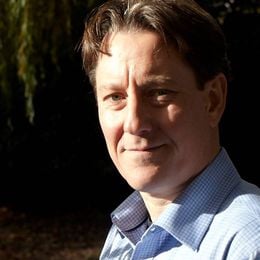Why Is Something as Important as Purpose So Hard to Find?
How this MD/MBA finally found fulfillment and hopes you will, too
I went to private schools from the age of 6 and to top universities until I was 25. I emerged a medical doctor with an MBA, but I did not know my purpose.

I was not aware, at the time, of what was driving me, why I was never fully satisfied with my career choices and the work I was doing. I felt the desperate need to leave clinical practice before my medical career had even begun.
I was good with patients. I enjoyed the interaction at a human level. But I did not feel the urge, the passion or the thirst for knowledge required to become a great doctor. And I wanted to be really great at something. To be recognized as an expert. To make a difference.
Discovering That Medicine Wasn't the Career for Me
I was halfway through my medical degree when I concluded that it was not the career for me. But, not knowing what else to do, I completed my medical training, registered as a doctor, and practiced as a locum [a fill-in doctor] for the 18 months, saving the money for an MBA which I saw as the next ticket to career fulfillment.
The MBA opened up a whole new world to me: of corporations, return-on-investment, business-speak. It was dazzling and mesmerizing at first. It was exciting. I rode the crest of early waves of health informatics and technology. Bouncing into ever-increasing job roles with larger corporations. Everything was good. But it was not, actually.
I was 36 when I had my first panic attack. I was in a monthly sales meeting, about to present my team's progress against targets, when the shutters came down. I'm not sure whether anyone noticed, but for about five seconds everything went black. When I came to, my hands were sweaty, my shirt was wet. But I shrugged it off and presented my slides. It completely bewildered me. Why did it happen?
What I Learned From My Panic Attacks
It was another month before I experienced the second attack. The panic attacks occurred pretty regularly from then on. My wife knows now, but at the time I was too ashamed to share this with her. I thought I would overcome this. I would battle through it.
I began to feel like a fraud. Inauthentic. Not true to myself.
I began to recognize a pattern in the panic attacks. As my career was progressing onwards and upwards, so was the organization's expectation of me. This pressure to deliver more translated to ever-increasing promises to customers and bosses.
I was never sure of my ability to deliver what I was promising. I began to feel like a fraud. Inauthentic. Not true to myself. Every sales meeting seemed to me to be a stream of lies. My status and accomplishments were a house of cards.
I felt compelled to leave another career. So, I walked into by boss's office and resigned. Just like that. Nothing else lined up. I just had to leave. Corporate life was clearly not my calling either.
In my forties, family and social life were great, but, career-wise, I was lost. I was educated, had degrees including an MD and was financially comfortable, but could not ignore the enormous gaping hole in my life — the lack of anything resembling a career. My friends all appeared to have found a comfortable career fit, though one couldn't know for sure; the fundamentals of life, purpose and legacy are not something we typically shared and explored together.
And then serendipity took my hand.
After three years in the wilderness, I entered and (to my amazement) won a national innovation competition funded by the National Health Service, which was looking for new ideas to help families care for loved ones who had dementia.
My Life-Changing Event
Winning that competition changed my life; I dived into the world of social entrepreneurship. I was amazed at the scale and complexity of the issues that needed fixing and the challenges that needed addressing. But I also realized my capacity to create order from chaos and to be comfortable with the discomfort of uncertainty.
I thirstily acquired new knowledge, learned the power of design-led thinking and pushed aside my previously held beliefs, prejudices and stereotypes as I searched for the essence of truth in the big problems of the world.
I began to draw people, organizations and funding towards me. And I grew as a person. Stronger, more resilient, measured and more humble.
Now, I feel enormous pride in what I do, what I hope to accomplish and the legacy I intend leaving behind.
What I am doing and hope to achieve are important, but what is more important is discovering them in the first place and finding purpose in them. If only it hadn't taken 20 years to do so.
But maybe if it hadn't, I wouldn't be the person I am now. Or maybe I would still be trapped, either unhappy in clinical practice or drowning in anxiety in the corporate world.
Find Your Purpose — At Any Age
There is no way that I can be unique in my experience and the only one whose early career choices were not best suited to my skills or goals. Are we really capable of making such massive life-defining decisions at the age of 18? And, are we permitted by social norms to make changes once we have realized our mistakes?
People in western cultures can now expect to live for 100 years. So, the front-loading of career decision-making in schools, colleges and universities cannot sustain people across a 60- to 70-year working life of multiple jobs and careers. The future of work demands reinvention, lifelong learning, resilience, entrepreneurship and, above all, the ability to periodically realign and rediscover our purpose.
Your purpose can change over time, frequently or occasionally.
In 2018, Gallup reported on the findings of a study of 30,628 adults and found that only 34% of workers were engaged in their work.
Wouldn't it be amazing if we all had access to a purpose engine throughout our lives that we could tap into when we needed it? Imagine what we could all become. How inspired, driven and productive we would be.
What is purpose? It's a goal that inspires you to progress. It is as relevant and important to young and old, and at every stage of your life.
Your purpose can change over time, frequently or occasionally. You can have multiple purposes, or just one that drives you at any point in your life.
Purpose can have a strong link with work, and independence, recognition and status.
Purpose can relate to your love and responsibility to your family, your relationship with friends or your passion for your community, or your faith.
Purpose is a positive energy. A driving force that is unique to you. And you must find it. It is so important that you do.


